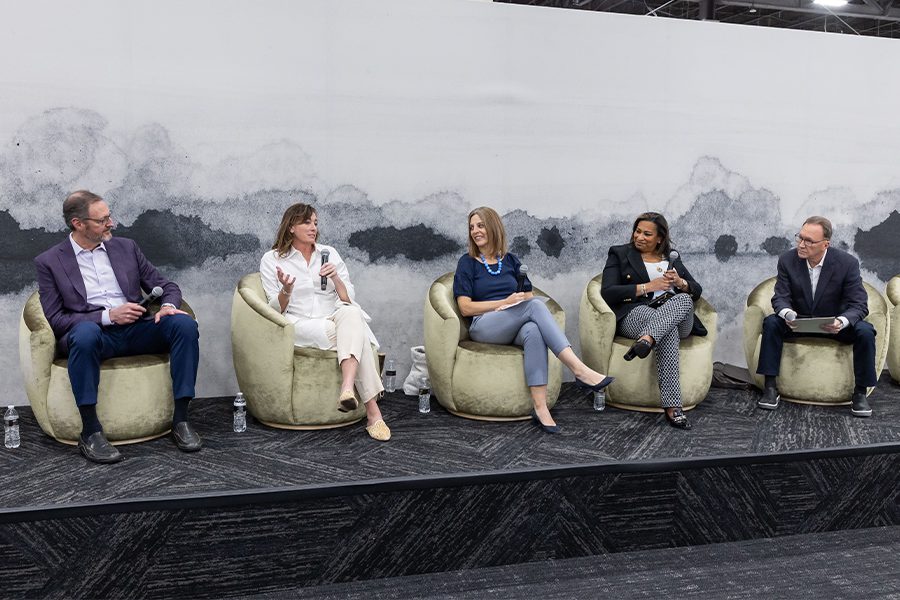Given that hospitality project teams are typically temporary, interdisciplinary, and quite complex, the only way to ensure success is with communication that is clear, concise, and complete. Industry leaders—including owners, A+D, purchasers, project managers, and contractors—discussed the importance of honesty, integrity, and more during the Building Radical Candor Across Teams panel at HD Expo + Conference 2023.
On building a successful team
Lori Horvath, managing director, JLL: As we think about putting RFPs together, we’re thinking about specific people for specific types of projects because we’re going to spend more time with them than our own families. We have to make sure we have the right people at the table. You need to have a good beginning to breed a good ending.
Adrienne Scribner, principal, Baskervill: It’s not just the outside teams you work with and collaborate with, it’s also your own internal teams. I start from the ground up, offering internships and going to schools to find the right staff. I help grow them in-house. There’s an old adage, ‘model what you want.’ If you’re not honest and don’t have integrity, that will follow you from job to job.
Meridith Zimmerman, senior vice president of design, RLJ Lodging Trust: We have anywhere from 10 to 15 projects going at one time. What helps bring the teams together is trust, honesty, and integrity, not just from our consultants and vendors but also from us. It’s a two-way street. We make sure everybody has the same goal. As owners, we talk and listen to everybody. It’s about managing expectations from the beginning of what we’re going to do, how we’re going to do it, who we’re going to do it with, and then getting everybody to come together and respect each other. If you’re already at the table, then we think you’re a good fit.

The Building Radical Candor Across Teams panelists: Alan Benjamin, Benjamin West; Lori Horvath, JLL; Adrienne Scribner, Baskervill; Meridith Zimmerman, RLJ Lodging Trust; and moderator William Smith, Shopoff Realty Investments
On setting expectations
Alan Benjamin, founder and president, Benjamin West: As a procurement agent, if the owner says we need this done in six weeks and you can’t do it in six weeks, don’t say no and walk away. We’ll go back and challenge that and say, ‘If six weeks is it, you’re not going to get A or B, but we’ll try to get you C.’
AS: From a vendor standpoint, a lot of times that motivates them to go back and do research and figure out a way to do it. I worked on the Moxy brand a long time ago and everybody wanted a black faucet, but no one could make a black faucet that would stand up to all the cleaners. Now, if you walk around this show, you’ll see 5,000 black faucets.
MZ: People want to feel included. They want to have approval, they want to be understood, and they want to be heard. When you set those expectations from the beginning, people have a sense of belonging. It makes a difference when you all have one goal and are dedicated to that goal.

Benjamin West worked with Parker-Torres Design on the Ritz-Carlton Naples in Florida, which boasts an expansive, light-filled lobby
On communicating and empowering employees
AB: Bad news is not a fine wine. It doesn’t get better with age. The moment you know something’s going wrong, communicate it to the entire team. Our whole culture is about high performance and getting things done. We tell the team, ‘Don’t try and be a hero every time. You’re not always going to have the rabbit come out of the hat.’ We have a saying in our office: Purchasing is a verb. There is always a solution. Use your network to figure out the best way to solve the problem.
LH: People are important. Every person we work with matters, and everyone thinks differently. When there’s a hiccup in the road, it’s important to be cognizant of what’s causing the issues. You can’t just check the box. Getting from A to B to Z is not the same for each individual.
AS: We give our younger staff members the power to communicate with the client and to learn how to problem solve. It gives them their own voice because they learn from it, and it makes them more effective. The next generation coming out of school is [savvy] with technology, but sometimes I want them to slow down. I let them go, but I have to reel them back in sometimes.
William Smith, senior vice president of design and construction, Shopoff Realty Investments: The issues change through the course of the project, and it’s my role to help my employees solve their problems so they can do a good job. If people are overloaded and you don’t do something about it, they’re going to make more mistakes. As a leader, you have to understand where those points are in order to help your employees. No matter what business you’re in, it’s all about communicating and honesty.

A rendering of the lobby lounge at the Design 360 Unlimited-crafted Pierside Santa Monica in California, an RLJ Lodging Trust project
On professional guardrails
AS: If you don’t have a project management company, one of the first things I do on a project is send [everyone] the schedule. If you send that email right away, it makes everyone pay attention to what’s the reality and what’s wishful thinking. Be honest and upfront with your owners.
LH: Even if we’re looking at a draft schedule at the beginning of the project, we, as a project management owner’s representation team, have involved all the players (procurement consultant, design team, architect, general contractor) because if you’re not agreeing in a draft format, you’re never going to get off first base.
On the key to a successful project
AS: Integrity. It’s one thing that no one can take away from you as long as you have it to start.
MZ: Treat everyone as you want to be treated. It’s an old saying, but it’s true. It’s also about understanding what makes people feel safe in environments where they’re not the majority. The diversity we have now in our industry is different from what it used to be, but not everybody feels safe. We want to make sure we are normalizing the conversation and that we’re mindful of that as we move through these projects.
AB: The key is to have the discipline to not take on that one bad project. It goes to trusting the gut.
LH: You can’t assume that because the solution worked the last time, it’s going to work on the next project. If you’ve seen one hotel, you’ve only seen one hotel because every single one of them is different.
More from HD:
Industry Leaders Discuss the Obstacles of Running a Business
Think Pink: 14 Hotels That Give Barbiecore
Artist Nick Cave Forays Into Textile Design



